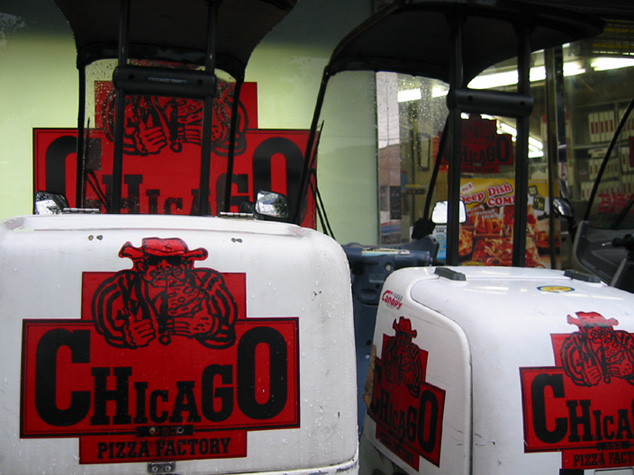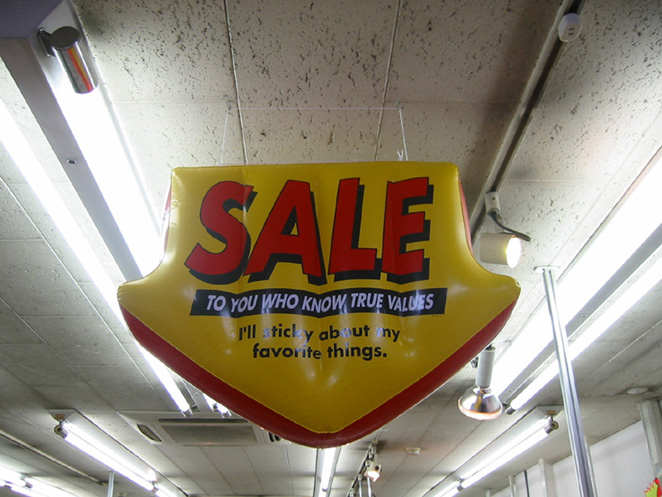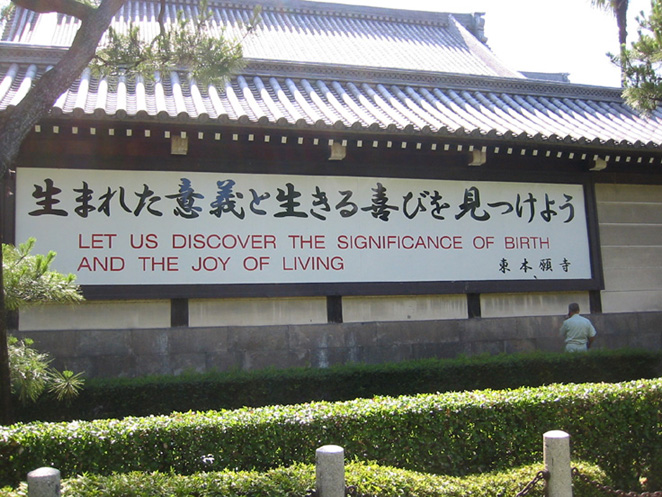October 27, 2003
Tonight is Game 7 of the Nippon Series. The Hanshin Tigers, hapless perennial losers, are trying to cap their dream year with a championship. They lost the first two games, won the next three, and lost last night. No matter what happens tonight, Osaka is going to explode. (Some of my students, upper-middle class types, named the Tigers' home stadium the most dangerous place in Japan, simply because of the lunatic fans.) I have noticed that they win when I wear my Tigers t-shirt, so I am going to do my part by wearing it today, even though it really ought to be washed. Japanese baseball fervor can match any city in America. A number of serious financial publications have credited the Tigers' success with the recent signs of recovery for the Japanese economy (since the last time the Tigers were any good was 1985, in the midst of the "Bubble Era" in Japan). The Tigers even have a curse of their own that's every bit as good as (if not better than) the stupid goat in Chicago or the Bambino in Boston.
Several people are walking around the neighborhood right now, chanting in long, deep tones. It is 8:50am.
Outside is Japan.
NEWLY CROWNED MY FAVORITE ENGLISH MISTAKE OF ALL TIME, ALTHOUGH PERHAPS YOU HAD TO BE THERE TO REALLY APPRECIATE ITI am having a spirited discussion with Takahiro, a high-level student, about medical care in countries around the world, comparing the insurance schemes of the United States, Japan, England and Canada. I note that one drawback to the sexy Canadian system, as told to me by an actual Canadian, is that doctors' salaries are capped by the government payouts, and according to the Canadian, a lot of the good doctors are moving to the U.S., where the real money is. (I have no idea whether that is true or not. I am certain, however, that my source was, in fact, from Canada.) Takahiro becomes interested in the issue of doctors' motivations for becoming doctors, whether pure altruism is a relevant consideration in the present age. We mull it over. Takahiro makes this observation about the current generation of Japanese doctors:
TAKAHIRO: Some of them are a little bit crazy. There have been some scandals recently.
TEACHER: What kind of scandals?
TAKAHIRO (excited): There was a very crazy doctor in Tokyo recently. It was a big scandal. I read it in the newspaper. He was saying to provide medical care for many patients. But actually he did experiments on them!
TEACHER: He did?
TAKAHIRO (in horror): Yes! He used his patient as a kind of marmot !!
TEACHER (after a long pause): I'm sorry, what?
TAKAHIRO: As a marmot! For his experiments!
TEACHER: Do you mean a guinea pig?
TAKAHIRO: Oh. Yes.
I gave him a level-up recommendation because of that. As a teacher, I tend to reward brilliant mistakes more often than mediocre successes. I asked Yoshiaki, the gravel-voiced, hard-living tennis coach, about his recent vacation trip to Okinawa. His eyes lit up. "I met the manta," he said. He'd gone scuba-diving, apparently, and seen a manta ray. I cheered and gave him a level-up recommendation. However, I merely winced when Masako, the elderly housewife, delcared that, after a stressful week, "I relieved myself this weekend".
I've been meaning to photograph this for quite some time. This is a popular pizza chain in the Kyoto area. I haven't tried their pizza, so I don't know if they're any good. But I do know one thing. Chicago, this is you:

Come on, Chicago. Don't deny it. That is you. (Especially you, Gianni Cutri.) Japanese pizza delivery places deserve credit for their cool delivery scooter-bikes. The pizzas go in the hatch in the back (visible on the right bike), and there's a roof for some reason, but it's on two wheels, so they can park on the sidewalk if they like. I haven't had any pizza here, as it's rather expensive and bound to be a disappointment. I miss it quite a lot, though. I haven't decided whether my first meal upon return to the U.S.A. will be a fucking gooey deep dish pizza or a mad blowout at a Mexican restaurant. All I know for sure is that you people in Chicago are in the mob and you wear striped suits with hats so quit pretending you don't.
Here is a threat:

They're serious. They will sticky about their favorite things. God help me, I've seen them do it.
THE 99 YEN SHOP: FIVE OBSERVATIONS1. 99 yen is roughly equivalent to one dollar, at least in conceptual terms. (The actual exchange rate is more along the lines of 110 yen to one dollar. This raises the interesting point that, in theory, we should be able to exchange 50 Cent for a Japanese rapper named 55 Yen.) There are several '99 Yen' stores throughout Kyoto. Unlike their American counterparts, the Dollar Stores, 99 Yen shops are full of useful items. They carry every manner of food and non-alcoholic drink, and although the dairy section should be avoided, it's really quite a good value in most respects. The other items on sale vary from store to store. My friend Nora reported seeing a vibrator at one; I did not doubt her for a moment. That all items within the store are priced at 99 yen is a moral absolute for these stores, a religiously-held founding principle from which they never, ever stray. It's strange to walk around a store where you can afford everything. One grows accustomed to approaching purchasing decisions through the schema of hierarchical price structures. At 99 Yen, though, all things are equal. Thankfully, their cookies are kind of shitty, or else I'd never buy real food.
2. Although the physical plant of the 99 Yen shop is roughly equivalent to just under half that of a Walgreens or Osco in America, there are five distinct music 'zones' within the store. The area near the cash registers is reserved for upbeat pop hits, while the strip at the back of the store, where pasta and canned foods are kept, broadcasts adult contemporary ballads. The two thin lanes on the left are silent, but the large center aisle alternates between two long jingles, "(Honky-Tonk Love Theme From) 99 Yen" and "99 (Girl On The Verge of a Funky Breakbeat Mix)". The former is in the style of Sonny and Cher, and the latter is a recording of a woman experiencing the Biblical Rapture while chanting the number 99. (The names are my own. You can trust me, though. I know of what I speak.) The side entrance and the front half of the far-right produce aisle feature a jaunty, cheerful march that would not be out of place in Bridge on the River Kwai. I spent a bit of time trying to locate the sonic no-man's-land, the point at which the maximum number of jingles converged into one. Surprisingly, the best I could do was to get the high notes (Honky Tonk Love Theme From) 99 Yen" to bleed meekly into the march.
3. Tight-Arse is a student at our school who only attends the Voice Room. It's a lounge where students can go -- at a lower cost than actual classes -- and participate in open discussions with other students and one teacher per class period. If a student is lucky, there might be no other students present, and he'll get the equivalent of a man-to-man 'class' with the teacher for a fraction of the price. (The teacher will be annoyed at him and is unlikely to teach him much, if anything, but value is achieved.) Tight-Arse, a salaryman in his late twenties, has been dubbed as such for a number of reasons, chief among which are his plans for his upcoming wedding: hire his friends as photographers and honeymoon in Osaka (30 minutes away on the train). Recently, he told me about the guilt he feels for buying most of his groceries at the 99 Yen Shop. (He buys his dinner at a normal grocery store every night, always waiting until that day's lunch food -- sushi, sandwiches, etc -- is marked down 20% right before the store closes. But he buys everything else at the 99 Yen Shop.) He wonders if he is doing the economy great injury by saving so much money. He also noted that his fiancee seems much happier when she is eating food that comes from fancy packaging (on instances when his mother buys food for him). He said that he did not plan to change, but he wanted my advice as to whether he should be feeling shame at the cash register. I pointed out that anyone who was there to cast shame upon him must also be guilty of savings, as they too were shopping at 99 Yen. He seemed pleased. Probably I should have encouraged him in the shame direction. I told him that it was fine to shop there now, but he better not do it when he has children.
4. In normal grocery stores, it's unnecessary but not deeply problematic when the cashier calls out the price of every item as he or she scans it. But I don't understand why the 99 Yen Shop does it, let alone why they do it with triple the fervor that anyone else does. Everything in the store costs 99 yen, from things that cost more than twice as much elsewhere to things that actually cost much less than 99 yen in other stores. Nothing is ever "on sale" for less than 99 yen. If the it is present in the store, then by definition it costs 99 Yen. And so, if the only possible price is 99 yen, why must the cashiers shriek out the price ("KYU-ju-kyu no kaiten" -- literally, "you purchased this item for 99") as they scan every single item in the purchase? They never, ever let an item pass without shrieking its price. (And 'shriek' is the word for it.) Does Japanese people appreciate this service? Gaijin certainly don't; some days, the sheer dread of it is enough to make me shop at another store. The repetition can't be good for the workers' mental health, either. If I worked there for a week, I'd bug out every time I saw the number nine for the next several months. (Perhaps that's how triskadekaphobia gets started.) One of my students works at one of the major department stores, standing by the escalator and yelling for people to come to his floor (women's lingerie). He says that his boss considers escalator-yellers to be absolutely critical for sales success, and he was in disbelief when I told him that not only do we not have escalator-yellers in the United States, but such people would actually hurt sales more than they'd help. I quickly changed the topic to the success of his favorite baseball team before feelings were hurt.
5. I think that the majority of Westerners would not expect the Japanese to be as into potato salad as they are. My students never mention potato salad when discussing their favorite foods, but it must be intensely popular, because 99 Yen and its competitors always have hundreds of potato-salad lunch packs ready for sale in the morning, and there are never more than a few left in the evening. I never liked potato salad as a child, thinking it a bizarre misuse of potatoes that were clearly meant to be mashed, but I never viewed it in the same way that I did the Satanic abomination of macaroni salad. (Why would you do that to macaroni? God damn, it still gives me chills.) I was starving one winter in college, and my friend Jenny Carroll gave me a huge vat of potato salad that she had made for her ROTC Christmas party. For reasons that were never made clear, the ROTC hadn't eaten any of it. So I lived on potato salad until the next semester's student loans came in, and now I'm down with it. One of my former housemates made potato salad for our Fourth of July party over the summer, and it was very good, so I traded CD-burning for more potato salad a few weeks later. Japanese potato salad is thin, less chunky than most American varieties. But it's okay.

Let me give fair warning that the next entry will be the most powerful in the history of this web-page.
